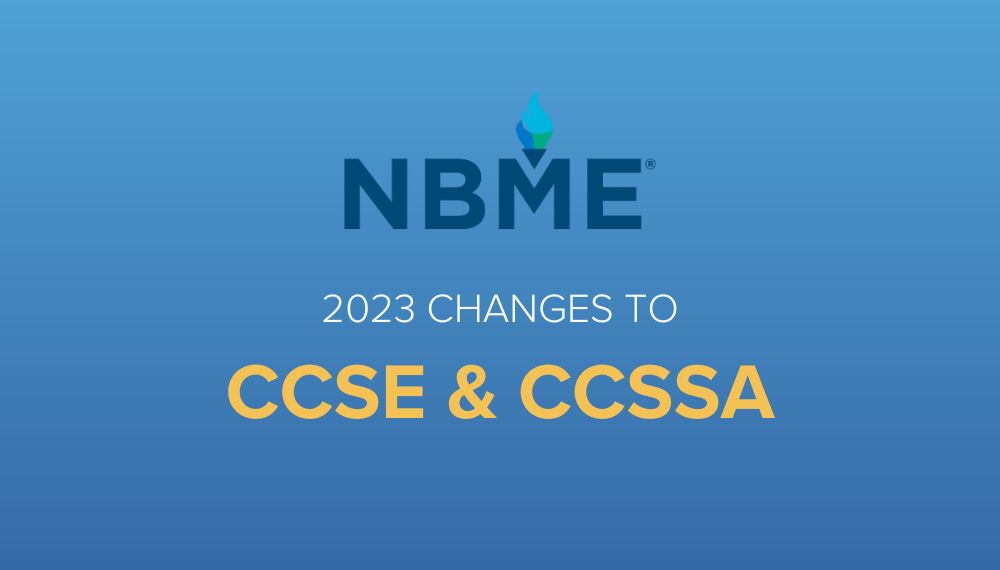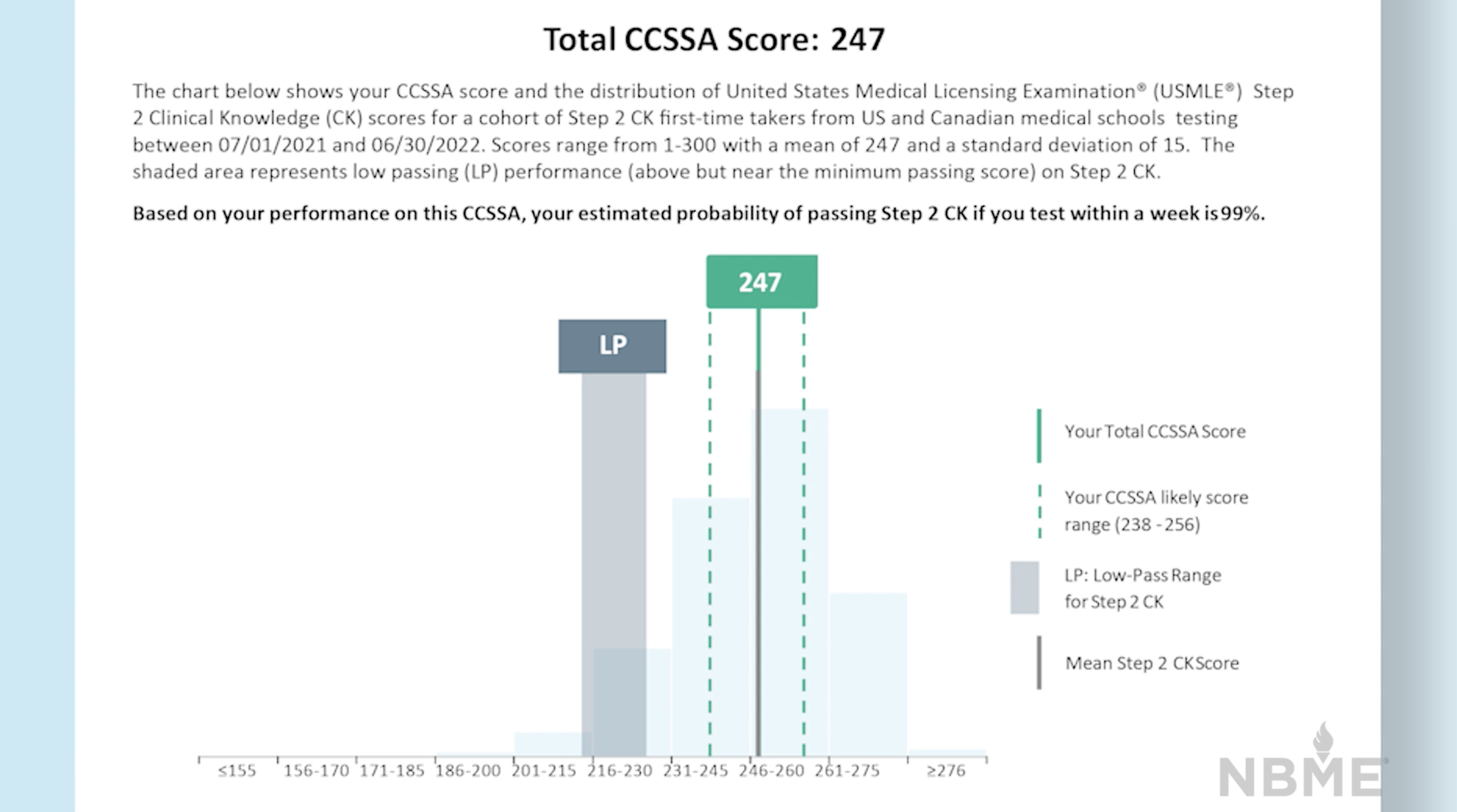Beginning December 5, 2022, the National Board of Medical Examiners (NBME) will update score reports for the United States Medical Licensing Exam (USMLE) Step 2 CK practice exams. Remember that, while the USMLE Step 1 is a “pass/fail” exam, Step 2 CK still provides a three-digit score that may be weighed in the residency application process. As a result, practice exams are valuable tools to assess your readiness to take the exam.
Read on to learn about these changes and the way they might influence how you prepare for Step 2 CK. For more information about the 2022 score report changes, head to the NBME website.
 Still looking for a Step 2 Qbank? Meet the new combined Step 2 & Shelf Exams Qbank with 5,000 practice questions that most closely match what you’ll see on your USMLE Step 2 and all of your shelf exams. Get started with 7-day FREE access!
Still looking for a Step 2 Qbank? Meet the new combined Step 2 & Shelf Exams Qbank with 5,000 practice questions that most closely match what you’ll see on your USMLE Step 2 and all of your shelf exams. Get started with 7-day FREE access!
What are the Step 2 CK practice exams?
Step 2 CK practice exams come in two forms. The first is the Comprehensive Clinical Science Self-Assessment (CCSSA). Four CCSSAs are currently published online and available to purchase for $60 each. The other format is the Comprehensive Clinical Science Examination (CCSE). Unlike CCSSAs, CCSEs are obtained by your medical school for the purpose of assessing student performance. You would have to work with your medical school to take these.
Regardless, both exams have a similar structure. They feature four sections of about 50 multiple-choice questions. In the standard pacing mode, you will have 75 minutes for each block, while in the self-paced mode, you will have up to five hours.
Important changes to the score reporting
The biggest change to these tests is how your performance is evaluated. Previously, the score report for these exams provided an estimated three-digit score to understand how you’re doing and time your exam accordingly. If you’re consistently scoring at or above your goal, you could move forward with the test, but if not, you might consider delaying it to have more time to study.
Instead of a three-digit score, you now will receive an equated percent correct and a percent likelihood of passing. The report will also provide feedback on how your overall performance and performance in different content areas compare to other test-takers. This is in line with similar changes in 2021 to the Comprehensive Basic Science Self-Assessment (CBSSA) and the Comprehensive Basic Science Examination (CBSE), the Step 1 equivalents of the CCSSA and CCSE.
How do I interpret my practice exam score?
Understanding how to interpret these numbers can be a little confusing. The new single most important data point on your score report will be the equated percent correct. This metric standardizes your performance across different exams. In other words, your uncorrected percentage correct would be scored up or down on a more difficult or easier exam, respectively. This allows you to gauge how you’re doing regardless of the level of difficulty of the test.
Because there isn’t a perfect conversion yet of how the equated percent correct will translate to a three-digit score on the exam, your goal should be to push this number as high as possible. Otherwise, the percent likelihood of passing is usually only informative if you are at or near the passing threshold. If you’re scoring significantly higher than the benchmark for passing, the number will plateau.
A helpful graphic on the report is a histogram of how test-takers performed (find an example above from the NBME CCSSA Sample Score Report). This graph will include a line marking where you performed and a shaded region demarcating the low passing range. Before you move forward with the exam, you should prioritize having at least two and ideally three or more practice tests within or comfortably above that low passing range to feel confident you will pass on test day. If you’re scoring below the lower limit of that range, you may want to consider budgeting more time to study and adjusting your study plan.
Other performance metrics and key exam features
The score report will also show how you performed in certain subjects, but this can be variably helpful. It’s intended to give you an idea of which content areas you should spend more time studying, however it may not always be exactly accurate. For example, your performance in endocrinology may fluctuate widely on these reports from one exam to the next. However, because only about 5% of the exam is related to endocrinology, you may simply have had less luck doing the 10 endocrinology questions on one exam compared to another. You should make a point to focus on content areas where you would like to perform better, but don’t place too much emphasis on these report graphics. Instead, rely on your instincts about your strengths and weaknesses to guide how you study.
Otherwise, in most other ways, these score reports and the exams are relatively the same. The CCSSAs will include content descriptions with statistics for individual questions. You can use these explanations to understand why certain answers are right and others wrong, much like you would use any other question bank for studying. CCSSAs and CCSEs will also retain the exam day interface, so you can know what to expect on test day and feel comfortable with the formatting.
Importance of practice tests
All of this is important because these practice tests are important. If you’re doing well on CCSSAs and CCSEs leading up to your exam, you can feel confident on test day. If you’re not quite at your goal yet, they can provide that feedback so you don’t take the exam too quickly. It’s better to be well-informed about how you’re doing than to be surprised when your score report comes back.
Of note, beyond these NBME-written exams, some question banks also provide practice tests with a subscription or for individual purchase. Most of these will still provide the more familiar three-digit score estimation. Regardless of the type of practice test, you should make it a priority to reach your goal score on multiple consecutive Step 2 CK practice exams before you sit for the real test. With enough studying and practice, you’ll have success on exam day.






